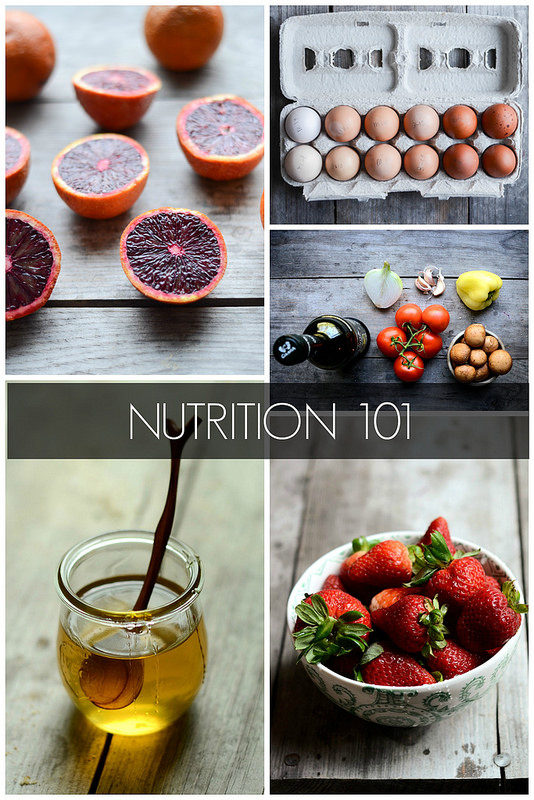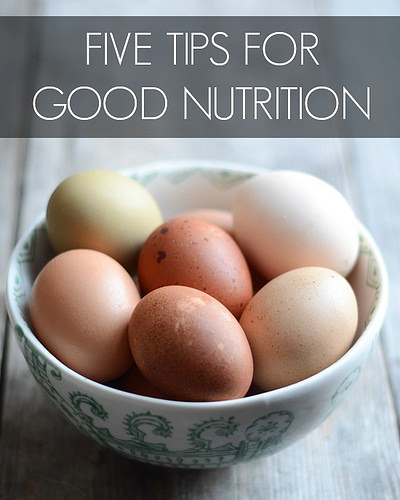
I suppose you could call me a “Traditional Foodie” (think Nourishing Traditions) – I believe that, as much as possible, we should cook and eat the way our great grandparents did. If a food has been “invented” in the last 50 years or so, you might wish to reconsider eating it.
Everyone has their own views on what foods are healthy and which aren’t. I’m sure some people aren’t concerned about the potential health benefits/risks of consuming certain foods, but most people have an inkling about good nutrition.
For example, most people would admit that fast food is not the wisest meal choice health-wise. Beyond the knowledge that junk food isn’t good for you, the waters can get pretty grey
5 Tips for Eating Well
It is my belief that even if you can’t afford the best ingredients in the world, if you are cooking the majority of your food from scratch you’re miles ahead of many people. Growing up we didn’t eat an organic diet, but my mom cooked almost everything from scratch. We had very few health problems. I’m not saying that this was the only reason we enjoyed good health, but I’m pretty sure that not consuming tons of soda and prepackaged food helped. We definitely had junk food for special occasions, but our meals were mostly homemade.
2) Avoid highly processed oils.
Most of the “vegetable oils” on the market today are not good choices. Polyunsaturated oils (oils that are liquid when cold) go rancid easily. They are unstable when heated.
Common polyunsaturated oils include: canola, corn, soy, sunflower, and “vegetable oil”. You can read more about the dangers of polyunsaturated oils HERE and HERE.
And of course everyone knows that trans fats are not good. Avoid all hydrogenated oils when possible.
3) Eat Organic/Local/Pastured When Possible
I know it’s not possible for everyone to afford an all organic diet (I know I can’t). I try to use the “Dirty Dozen Clean Fifteen” list, especially when shopping for Helen. A great alternative to organic is to buy local food. If you talk to farmers, they’ll tell you what they used for fertilizer and if any pesticides were used.
It’s also important to try to buy quality meat. Beware of labels claiming to be “all natural.” Your best choice is local meat raised on pasture without the use of hormones. I can source pasture raised meat from our local farmers market and health food store. Organic would be my second choice.
The same goes for eggs and dairy products.
4) Avoid highly processed packaged food.


Erika
Wednesday 1st of October 2014
Good tips! How about a post in reference to #4 - prepackaged versus healthy alternatives :)I've taken some baby steps lately, but still have a long way to go. I think one of the easiest things to do at first is to just buy a healthier version of a convenience food. (Organic tortilla chips instead of Ruffles, etc! ) Keep the good tips coming!
Erica Lea
Wednesday 1st of October 2014
That's neat that you saw a definite change when you went on a high fat diet. Yay for healthy fats! Thanks for sharing. :)
Erica Lea
Wednesday 1st of October 2014
Good point, Sandy! Some things, like pickles or sauerkraut, could be labeled low-fat and still be healthy. :)
Erica Lea
Wednesday 1st of October 2014
Yes, I definitely think companies have to compensate for the flavor of fat with sugar and also with fillers to make the yogurt thicker. I always try to buy full fat yogurt (or Greek yogurt with extra cream!). :)
Sandy
Wednesday 1st of October 2014
Absolutely! I avoid everything that is labeled no-fat or low-fat or reduced-fat! Of course, some companies put a "no-fat" label on things that never had fat in them just to draw the low-fatters to their product.